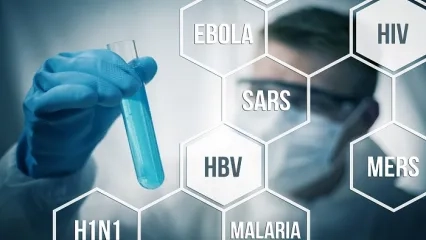Alo Yeditepe
Alo Yeditepe
Viral Hepatitis and Prevention Methods
Assoc. Prof. Dr. ALICI: “Those with first-degree relatives who have hepatitis should definitely undergo screening.”
Since viral hepatitis is contagious, it poses great risks to public health. Particularly types B and C cause chronic disease in hundreds of millions of people and are among the most common causes of loss of life due to liver cirrhosis, liver cancer and viral hepatitis. Infectious Diseases Specialist Assoc. Prof. Dr. Özlem ALICI points out that approximately 354 million people worldwide live with hepatitis B or C and that most of them still do not have access to testing and treatment. Dr. ALICI said, “According to WHO's 2024 Global Hepatitis Report, the mortality rate due to viral hepatitis is increasing and it ranks second among fatal infectious diseases, with 1.3 million deaths per year.” said. Making important statements on the occasion of World Hepatitis Day, Dr. ALICI said that especially those with first-degree relatives suffering from hepatitis should be screened.
Viral hepatitis are infections caused by various viruses that cause inflammation in the liver. There are five main types of hepatitis viruses. A, B, C, D and E. Although all of these types cause liver disease, they differ in terms of transmission routes, disease severity, geographical distribution and prevention methods. Yeditepe University Kozyatağı Hospital Infectious Diseases Specialist Assoc. Prof. Dr. Özlem ALICI said that especially B and C types cause chronic diseases in hundreds of millions of people and are among the most common causes of loss of life due to liver cirrhosis, liver cancer and viral hepatitis. Dr. ALICI said, “Since viral hepatitis is contagious, it carries great risks for public health. “Approximately 354 million people worldwide are living with hepatitis B or C, and for many, access to testing and treatment remains impossible.” She said.
It ranks second among the infectious diseases that cause loss of life.
Assoc. Prof.Dr. Özlem ALICI stated that, according to the 2024 Global Hepatitis Report of the World Health Organization (WHO), the mortality rate due to viral hepatitis is gradually increasing and it ranks second among fatal infectious diseases, with 1.3 million deaths per year. Dr. ALICI cited important statistics: “According to WHO 2022 data, approximately 254 million people worldwide are living with chronic hepatitis B infection and approximately 1.2 million new infections occur every year. In 2022, hepatitis B caused an estimated 1.1 million deaths, mostly from cirrhosis and liver cancer. Again, according to WHO data, approximately 50 million people worldwide have chronic hepatitis C virus infection and approximately 1.0 million new infections occur every year. Hepatitis C caused approximately 242,000 deaths due to cirrhosis and liver cancer in 2022.”
Assoc. Prof. Dr. ALICI points out that there is an increase in the spread of Hepatitis B and C infections in some regions and a decrease in some regions While the reasons for the increase include inadequate health services, hygiene deficiencies and lack of awareness, Dr. ALICI generally attributes the decrease to the widespread use of vaccination and the use of effective treatment methods
It Causes Both Individual and Social Problems
Reminding that people with hepatitis may face stigma and discrimination in their social and business lives due to their disease, Assoc. Prof. Dr. ALICI said that this situation can lead to social isolation. Dr. ALICI also pointed out that the treatment process, health problems and workforce loss can affect their careers and daily lives. In addition, she explained that concerns about contagion in the workplace and difficulties in the treatment process are also important factors.
Reminding that hepatitis is a disease that has important health and economic effects on society as well as the individual problems it creates, Assoc. Prof. Dr. ALICI "If left untreated, it can lead to liver disease and cancer, increasing the need for healthcare and reducing quality of life," Dr. ALICI said. Economically, it creates financial burdens such as disease treatment, care and workforce loss. Additionally, individuals with hepatitis may face additional challenges such as problems accessing treatment and social exclusion.” she said.
Hepatitis Virus Can Be Transmitted in Many Ways!
"An important point to note about hepatitis viruses is that transmission occurs in many different ways," said Assoc. Prof. Dr. ALICI provided the following information; “Hepatitis B and C can be transmitted through blood, sexual contact and from mother to baby during birth. Those at risk include those in close contact with infected individuals, healthcare workers, drug users who share infected needles, those who have unprotected sexual intercourse with an infected partner, and family members of Hepatitis B or C carriers.”
Assoc. Prof. Dr. ALICI stated that with early diagnosis and treatment, it is possible to prevent the diseases from becoming chronic and liver complications, as well as to limit the spread of the disease. “Therefore, it is extremely important to protect the health of both individuals and society,” she said.
“Vaccination Rates Should Be Increased, Especially in Babies and Children”
Assoc. Prof. Dr. Özlem ALICI said that vaccination is very important in protecting hepatitis infections and preventing their spread. Dr. ALICI summarized the situation regarding vaccines as follows: “Today, vaccines are available against hepatitis A and hepatitis B. Hepatitis A vaccine is used in only a few countries, and wider implementation has the potential to control outbreaks. Hepatitis B vaccine is a very safe and effective vaccine; More than 1 billion doses have been used worldwide since 1982. In 2020, the rate of receiving three doses of hepatitis B vaccine was 83%, and 42% of children received one dose at birth. Increasing vaccination rates, especially among infants and children, will reduce HBV infections and therefore lower rates of liver disease and death. Hepatitis B vaccine prevents the development of chronic infections by 95%. Protection lasts at least 20 years and additional dosing is not currently recommended by WHO.
There is no vaccine for Hepatitis C.”
Pointing out that great progress has been made in recent years, especially in the treatment of Hepatitis C, Assoc.Prof. Dr. ALICI said, “Especially direct-acting antiviral drugs have provided high success rates in the treatment of Hepatitis C. "There are also developments in hepatitis B vaccines and treatments, and new vaccines that provide more effective and long-term protection are being developed." she said.
“There is Still a Misconception in the Society that Hepatitis Is Not Treated”
Assoc. Prof. Dr. ALICI pointed out that despite all the studies carried out on the disease and its spread, there are still some misinformation and beliefs in society. Dr. ALICI “Common misconceptions about hepatitis include the idea that the disease is only seen in certain groups and is incurable. To correct these misunderstandings, social awareness campaigns, educational programs and accurate information sharing are important. Public health policies should support the prevention, early diagnosis and effective treatment of hepatitis infections. In the future, it is expected that hepatitis will be better understood, effective vaccines will be developed, and treatment methods will be improved. "In addition, increasing awareness of hepatitis in society, increasing vaccination rates and strengthening early diagnosis programs are important points for prevention."
WHO Said “Now is the Time to Take Action”!
Assoc. Prof. Dr. ALICI said that there are still some difficulties and inequalities in access to hepatitis treatment around the world, and especially in developing countries, limitations in access to hepatitis treatment and medications may prevent patients from accessing appropriate treatment and may cause the disease to progress or develop serious complications. Dr. ALICI explained that this year, WHO emphasized that societies and health systems should take action for the prevention, early diagnosis and effective treatment of hepatitis infections, with the motto "Time to Act".
“There is a Good Infrastructure in Turkey for Access to Treatment and Medicine”
Infectious Diseases Specialist Assoc. Prof. Dr. Özlem ALICI stated that there is generally a good infrastructure in access to hepatitis treatment and medications in Turkey and concluded her words as follows: “Thanks to the health policies and programs carried out by the Ministry of Health in Turkey, important steps are being taken in the fight against hepatitis infections. In Turkey, hepatitis treatment is generally offered in hospitals and health centers. Appropriate treatment and medications are provided to hepatitis patients in line with the protocols determined by the Ministry of Health. Additionally, hepatitis B vaccine is also administered within the scope of the routine vaccination program in Turkey.
About
Faculty and Year of Graduation:
Selçuk University, 1993
”
See Also
- Infections Common in Hot Weather
- What is Hepatitis B? What are its symptoms? How is it Transmitted?
- What is West Nile Virus? What are the Symptoms and how is it Transmitted?
- Don't Be Late Fighting Against Diseases
- Information on H1N1 (Swine Flu)
- Office Hygiene: The Most Common Areas Where Microbes are Found in the Office
- Do Not Put a Cigarette Butt or Pour Olive Oil or Liquid Soap on the Tick
- What is COVID-19?
- Ways to Prevent Coronavirus
- Swine Flu / H1N1
Alo Yeditepe




